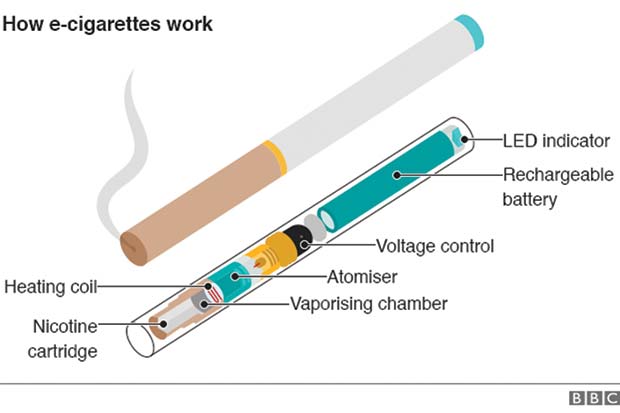The health minister has backed down on plans to ban the use of e-cigarettes in all enclosed public places in Wales.

Instead the Welsh government will change its Public Health Bill so they will only be banned in schools, eating places and on public transport.
In a debate in the Senedd, Mark Drakeford told AMs his personal view had not changed. But he said he recognised his responsibility as minister to find an agreement.
He said he would bring forward amendments to define more precisely enclosed spaces where e-cigarettes would be prohibited.
He told AMs: “I’m not prepared to do nothing in the hope that harm might not occur”.
Previously the Welsh government said it wanted to restrict the use of e-cigarettes in exactly the same way as tobacco.
It was concerned their use may “normalise” smoking for children and young people while ministers feared they may act as a “gateway” into smoking tobacco.
• On some, inhalation activates the batterypowered atomiser, others are manually switched on
• A heating coil inside the atomiser heats liquid nicotine in a cartridge
• The mixture becomes vapour and is inhaled. Many have an LED light to simulate traditional cigarette glow
• Different brands contain different chemical concentrations
The ban, intended to come into force in 2017, would have been a first in the UK.
Ministers pointed to concerns by the World Health Organisation and steps taken in 40 other countries to regulate e-cigarettes, but it divided opinion among health and medical groups.
Some anti-smoking groups including Ash Wales, Cancer Research UK and Tenovus opposed restrictions, saying they helped smokers kick the habit.
A major review by Public Health England found ecigarettes were 95% less harmful than tobacco and could be prescribed on the NHS in future to help smokers quit.
Before the debate, experts from universities and the National Centre for Smoking Cessation and Training wrote to AMs claiming there was no evidence to justify the legislation.
They claimed it would discourage smokers to switch from smoking to e-cigarettes.
Public Health Wales, local health boards and the BMA supported the curbs while opposition politicians called it a “huge step backwards”.
The proposals also divided the group of AMs which looked in detail at the proposal.
The five Labour members supported curbs on e-cigarettes but they were opposed by four opposition AMs.
Less stringent restrictions on e-cigarettes than those on tobacco were suggested and that appears now to have been accepted by the health minister.
ANALYSIS by Owain Clarke, BBC Wales health correspondent
This decision can be interpreted in two ways.
Some critics will view it an embarrassing climb down – and ask why did the health minister press ahead with the proposed ban in the face of significant opposition and unclear evidence.
Supporters of the Welsh government will say he has acted responsibly, listened to the debate and acted accordingly – an example perhaps of democracy in action.
The watering down of the proposed e-cigarette ban in public places does raise some questions about what exactly the Welsh government’s flagship Public Health Bill will now ultimately achieve.
Previously, a plan to introduce a minimum price for alcohol from the bill was taken out and introduced as separate legislation over fears of legal challenges.
Perhaps the decision reflects the health minister’s fears that without a majority a political row about the scope of e-cigs ban could scupper the entire legislation.
This whole debate also raises another question about the role of government and the timing of the bill.
In seeking to restrict the use of e-cigarettes, were ministers acting responsibly to protect the public, just in case they were found to act as a gateway to tobacco?
Or was the Welsh government here being premature, too willing without evidence to interfere in people’s lives?




Comments are closed.